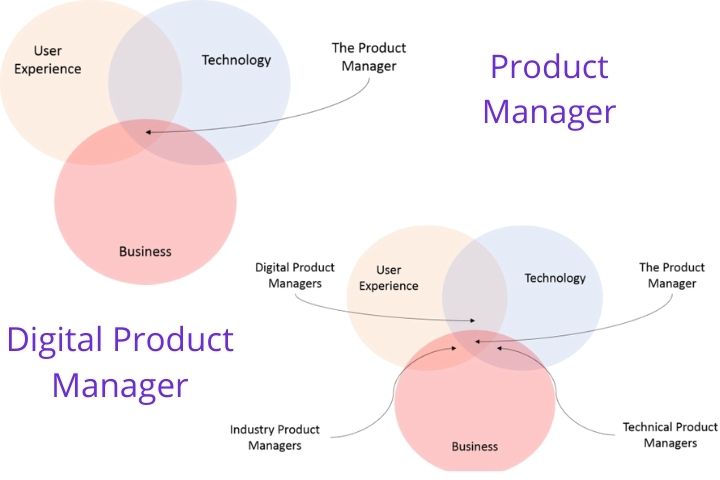Differences Between The Product Manager And Digital Product Manager

If there is something that most of the founders of startUps agree on, it is that the figure of the Product Manager is essential for the development of our projects. But we also know that there are subtle differences between a Product Manager and a Digital Product Manager that we are going to help you discover in this article.
Differences Between The Digital Product Manager and Product Manager
Both a Product Manager (PM) and a Digital Product Manager (DPM) exercise very similar competencies and functions, aiming to design, develop, improve, and launch goods or services on the market. But between both profiles, it distinguishes some particularities that we will see below.
The type of product is the main difference since the PM is based more on conventional products; the DPM works with products or in digital environments. The peculiarity is in the new consumption habits, a multichannel purchasing process, and the process of designing and validating the product before launching it.
The product creation and validation phase are much slower for the Product Manager than for the Digital Product Manager. While in the traditional world market research is essential, in the digital world, it is not so much because it is based on talking to real customers and doing many pre-launch tests to “Get it wrong, get it wrong quickly and without much cost.”
Knowledge of the language of technology and relations with design and development teams is also a fundamental skill that must differentiate this profile because it is in constant communication with them.
The digital product manager analyzes the market, meets the customer, and designs the product. Being digital, it will use methodologies such as Google Sprint or Lean Launchpad and apply knowledge of UX Design and Design Thinking, prototyping, the definition of value proposition, and validation in the market with customer development and more real with testing and A / B tests.
It also uses GTD productivity techniques and directs projects using agility. This fundamental feature allows you to use the minimum resources to learn quickly and pivot as soon as possible.
Last but not least, he will be responsible for building the growth machine and the purchasing funnel and establishing the control KPIs.
In Marketing aspects, Digital Product Managers work more commonly on strategies more focused on results and faster growth, since digital products tend to have a shorter life cycle than physical ones.
DPMs have a significant advantage over PMs of having a large volume of market data, especially of users and their behaviors, by knowing more in detail what they are looking for on the Internet, interests, and leading consumer platforms. It is for this reason that they are always in constant communication with digital content managers, developers, designers, and UX experts.
Finally, I would like to clarify that all those who already work as Product Managers have a great opportunity in this sector because they are undoubtedly the best prepared to acquire these new skills and solve the needs of the industry.
The Digital Product Manager Profile, Essential In Companies
The Digital Product Manager is in charge of promoting product sales in the company. It must also detect those market niches in which the company can cover a need and implement the marketing plan strategies that have been developing and lead the coordination between the different work departments.
The Digital Product Manager has a multifaceted profile and, above all, he must have 3 essential aspects to carry out his work:
- Business. It would be best if you focused on optimizing the product to the maximum to achieve the company’s objectives, with the minimum cost and recovering the initial investment.
- Technological. In this sense, we are not talking about having programming knowledge, but rather understanding the effort involved in other colleagues working with all kinds of codes.
- User Experience. The Product Manager ends up being the voice of the consumer within the company. You must test and analyze the products to visualize possible failures in the purchase process and improve them afterward.
What Other Functions Does The Digital Product Manager Perform?
- You need to have an analytical and curious vision for all the objects around you.
- Identify possible business opportunities and the transformation and improvement of the company’s products.
- Pay attention to the details of each product that comes onto the market to determine what really interests the consumer.
- Understand how the market works to define action strategies.
- Create a marketing plan based on the needs that users seek to satisfy in different products.
- It helps the segmentation of clients, depending on the needs of each one.
In addition to needing to have these qualities marked on his person, he also performs other essential tasks in the company’s management, as you can see in this video:
Why Train To Be A Digital Product Director?
The profile of the Digital Product Director is extensive; whether you are dedicating yourself to the publishing or technological world, your analytical skills and curiosity to discover new products will be your great asset. To gain experience in the sector and reach a Digital Product Manager position, you have to have many skills, some of which we have described above.
Also Read : New Marketing Trends And Marketing Strategies


